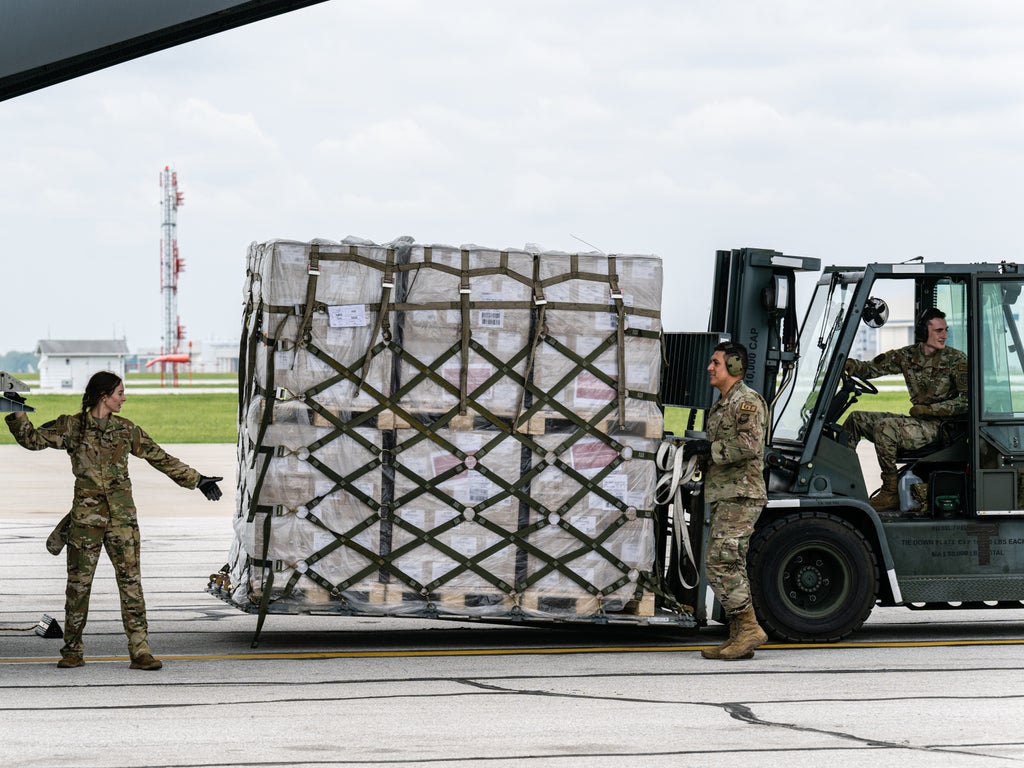
Written testimony from the commissioner of the Food and Drug Administration laid the blame for the delayed actions following contamination reports at a baby formula plant in Michigan on a Covid-19 outbreak at the factory as well as a “failure in FDA’s mail room”.
FDA Commissioner Robert Califf’s prepared testimony ahead of a Congressional hearing on Wednesday says that these problems meant that the agency didn’t begin its inspection of the facility until 31 January – over three months after becoming aware of the first infant Cronobacter infection who allegedly was fed powdered infant formula made at the Sturgis facility run by Abbott Nutrition.
Wednesday’s hearing focused on the nationwide shortage of baby formula that has prompted parents to scramble to find ways to feed their infants and children with medical problems. Some children have even been hospitalized because of the low supply of sustenance.
The FDA is facing increasing criticism for its handling of the crisis that was mostly prompted by a February recall and the shutdown of Abbott’s Michigan plant. The facility produced most of the US supply of powdered Similac and certain specialized formulas.
The plant was closed after reports of four infants who either grew ill or died after consuming formula from the facility. An FDA inspection allegedly found unsanitary conditions, and almost four months later, the plant is still closed.
Abbott said on Tuesday that it had struck an agreement with the FDA to send out limited supplies of EleCare hypoallergenic specialised formulas for free to those in need to counteract the shortage. They also said production at the Sturgis plant would restart on 4 June and that they would prioritise the production of EleCare, adding that the product would be available around 20 June.
The Abbott plant received 16 complaints between 2019 and 2021 concerning infants becoming ill after drinking products from the facility. The company said in a statement that bacteria found in areas of the plant that doesn’t come in contact with the product haven’t been connected to any known infant diseases.
Abbott chief executive Robert Ford apologised for the company’s part in the shortage crisis in an op-ed in The Washington Post on Saturday. He added that they would financially support families who incur medical bills as a result of the shortage.
“We’re sorry to every family we’ve let down since our voluntary recall exacerbated our nation’s baby formula shortage,” he said.
Congress passed two bills last week and President Joe Biden invoked the Defence Production Act in an attempt at increasing supply.
The Defence Department has flown in formulas from Zurich, Switzerland to Plainfield, Indiana and Mr Biden has also directed manufacturers of ingredients to prioritize sending supplies to formula makers, adding that price gouging and unfair sales methods would be cracked down upon.

“We appreciate the opportunity to discuss conditions at the Abbott Nutrition facility in Sturgis, Michigan, which led to the recall that contributed to the current supply disruptions; our infant formula supply chain monitoring and mitigation efforts; and additional tools necessary if we are to prevent, monitor, and mitigate any future infant formula supply disruptions,” the FDA’s written testimony said.
Some lawmakers are blaming the FDA for the shortage. House Appropriations Committee Chair Rosa DeLauro, a Connecticut Democrat, has said that she got a substantive report from a former Abbott employee who registered a number of complaints concerning conditions at the Sturgis plant with the FDA in October of last year.
But the agency didn’t speak to that person until late December, Ms DeLauro said at an April hearing. The inspection didn’t start until 31 January and the recall was issued first on 17 February.
“Why did the FDA not spring into action? Why did it take four months to pull this formula off store shelves?” Ms DeLauro said last month.
The FDA’s prepared testimony states that on 26 October 2021, the FDA Detroit District Office received “a hard copy of a complaint from a confidential informant” but that FDA leadership didn’t “receive direct copies of the complaint due to an isolated failure in FDA’s mailroom, likely due to COVID-19 staffing issues”.
Jerry Mande, an Obama Agriculture Department official told The Washington Post that the FDA should consider how its actions may impact supply.
“Formula must be safe, absolutely,” he said. “But this is a complex issue, not only for infants, but for others who rely on specialty formula products, where shutting off supply could cause deaths, too. You must carefully balance both and the steps you’re going to take.”







